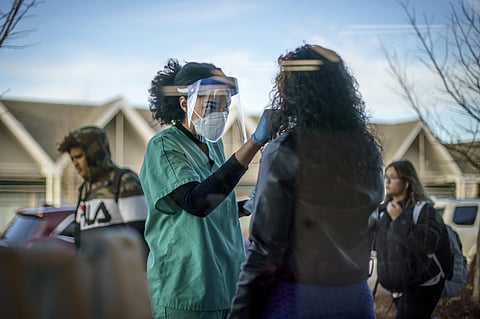Mild, but serious: Why we shouldn't neglect Omicron
CHENNAI: The emergence of the Omicron variant has altered the course of the pandemic yet again. As many countries eased restrictions and many households prepared for festivities, the new variant forced authorities to scramble for policies to help stop its spread.
According to research, Omicron's symptoms are 'very mild' compared with those of Delta, and distinct from them. Many people claim that the effects of this variant are not as severe as those of the Delta variant, but they have grossly underestimated the rate at which this variant transmits and the virus population multiplies, negating any claims about its severity. Here are a few reasons why people should take the Omicron variant seriously.
When compared to Delta, Omicron was associated with a 5.4-fold increased risk of reinfection.
Omicron is more contagious than the Delta variant, and an infected individual can spread the disease to healthy people at a faster rate than any of the previously identified variants.
Seeing Omicron symptoms as mild, infected people often go unnoticed and unintentionally spread the disease to others. This variant has the potential to infect a greater number of people than previously recorded.
It is widely assumed that the Omicron variant has fewer complications and does not result in death. However, this is an exaggeration, as individuals (particularly those in the vulnerable category) around the world still require hospitalisation (including ICU care), and even deaths have been reported. Omicron may not have a significant impact on healthy people, but its high incidence rate places people in a vulnerable category in a dangerous situation.
Based on the impact it caused during the second wave, the Delta variant proved to be extremely dangerous. While the initial symptoms of both the Delta and Omicron variants are nearly indistinguishable without testing, symptomatic individuals who believe they have the latter and remain carefree without testing endanger themselves and those around them.
When preliminary evidence suggested that COVID-19 vaccines may be less effective against infection and transmission associated with the Omicron variant, people became vaccine-hesitant. However, the vaccine still provides a high level of protection, so vaccinated people are less likely to experience the hospitalisations and long-term morbidity that unvaccinated people may experience after contracting the virus. Booster doses have already been shown to be extremely effective in controlling the current situation.
Steps to take
It is critical to recognise that the pandemic is still ongoing and that there are numerous variables that can cause the number of infected populations to skyrocket. While the government and authorities are in charge of controlling the overall situation, each individual is also responsible for taking the necessary precautions to avoid becoming infected or infecting others.
To limit the damage that the Omicron variant may cause, it is critical to understand the basic instructions that have been repeated since the outbreak began.
Wear a mask at all times.
Maintain social distance at all times.
Avoid places where there are crowds or gatherings.
Stay in well-ventilated areas rather than confined spaces.
Even if the symptoms aren't obvious, it’s always a good idea to get tested right away.
Seek medical attention as soon as possible to reduce the risk of complications.
Collect all of the necessary information about home isolation (This is critical, as the majority of those infected with Omicron can be managed by home isolation).
Make certain that you, your family, friends, communities, and even people on the street exhibit responsible behaviour.
Get vaccinated in accordance with the law it will help reduce the chances of being hospitalised or experiencing long-term morbidity.
Irresponsibility in adhering to required procedures during such a time will put significant pressure on healthcare infrastructure. If even only 1 per cent of positive patients require hospitalisation, our country’s healthcare infrastructure will be stretched, and we will face the very same crisis as that of the second wave of COVID-19 - lack of beds and other medical facilities.
Hence, it is critical that individuals make personal efforts to manage the virus and ensure that we overcome the pandemic as early as possible.
(The writer is a consultant, Internal Medicine, Dr Mehta's Hospitals)

